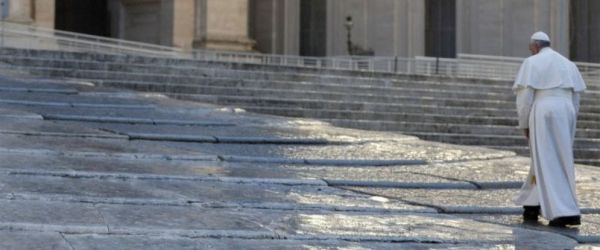Today’s Liturgy offers us the encounter between Jesus and a man who “had great possessions” (Mk 10:22), and who went down in history as “the rich young man” (cf. Mt 19:20-22). We do not know his name. The Gospel of Mark actually speaks of him as “a man”, without mentioning his age or name, suggesting that we can all see ourselves in this man, as though in a mirror. His encounter with Jesus, in fact, allows us to test our faith. Reading this, I test myself on my faith.
The man begins with a question : “What must I do, to have eternal life?” (v. 17). Notice the verbs he uses: “must do ” — “to have ”. Here is his religiosity: a duty, a doing so as to obtain; “I do something to get what I need”. But this is a commercial relationship with God, a quid pro quo. Faith, on the other hand, is not a cold, mechanical ritual, a “must-do-obtain”. It is a question of freedom and love. Faith is a question of freedom, it is a question of love. Here is a first test: what is faith for me? If it is mainly a duty or a bargaining chip, we are off track, because salvation is a gift and not a duty, it is free and cannot be bought. The first thing to do is to free ourselves of a commercial and mechanical faith, which insinuates the false image of an accountant God, a controlling God, not a father. And very often in life we experience this “commercial” relationship of faith: I do this, so that God will give me that.
Jesus, in the second step, helps this man by offering him the true face of God. Indeed, the text says, “Jesus looking upon him loved him” (v. 21): this is God! This is where faith is born and reborn: not from a duty, not from something that is to be done or paid, but from a gaze of love to be welcomed. In this way Christian life becomes beautiful, if it is not based on our abilities and our plans, but rather based on God’s gaze. Is your faith, is my faith tired? Do you want to reinvigorate it? Look for God’s gaze: sit in adoration, allow yourself to be forgiven in Confession, stand before the Crucified One. In short, let yourself be loved by him. This is the starting point of faith: letting oneself be loved by him, by he who is father.
After the question and the gaze there is — the third and final step — an invitation from Jesus, who says: “You lack one thing”. What was that rich man lacking? Giving, gratuitousness. “Go, sell what you have, and give to the poor” (v. 21). It is perhaps what we are missing too. We often do the bare minimum, whereas Jesus invites us to do the maximum possible. How many times are we satisfied with doing our duties — the precepts, a few prayers, and many things like that — whereas God, who gives us life, asks us for leaps of life! In today’s Gospel we can see this passage from duty to giving, clearly; Jesus begins by recalling the Commandments: “Do not kill, do not commit adultery, do not steal….”, and so on (v. 19) and arrives at a positive proposal: “Go, sell, give, follow me!” (cf. v. 21). Faith cannot be limited to [a series of] “no”, because Christian life is a “yes” a “yes” of love.
Dear brothers and sisters, a faith without giving, a faith without gratuitousness is an incomplete faith. It is a weak faith, a faith that is ill. We could compare it to rich and nourishing food that nonetheless lacks flavour, or a more or less well-played game, but without a goal: no, it isn’t good, it lacks “salt”. A faith without giving, without gratuitousness, without works of charity, makes us sad in the end: just like that man who returned home “sorrowful” with a fallen countenance, even though he had been looked upon with love by Jesus in person. Today we can ask ourselves: “At what point is my faith? Do I experience it as something mechanical, like a relationship of duty or interest with God? Do I remember to nourish it by letting myself be looked at and loved by Jesus”? Letting oneself be gazed at and loved by Jesus; letting Jesus look at us, love us. “And, attracted by him, do I respond freely, with generosity, with all my heart?”.
May the Virgin Mary, who said a total “yes” to God, a “yes” without “but” — it is not easy to say “yes” without “but”: Our Lady did just that, a “yes” without a “but” — let us savour the beauty of making life a gift.
[Pope Francis, Angelus 10 October 2021]












